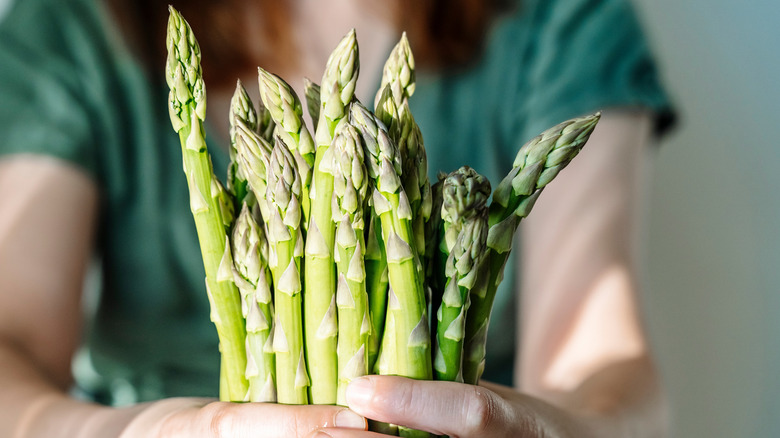
Gilaxia/Getty Images
When your bowels aren’t moving, you may experience a range of uncomfortable side effects. These can include anything from slight bloating and cramping to intense bouts of pain. While medications can help with occasional constipation, food can sometimes provide a natural treatment as well. In fact, one unexpected green vegetable can help loosen your stools so you can go to the bathroom.
Available year-round, asparagus is known for having a strong taste, as well as acids that can change the odor of your urine. However, it also contains a nutrient called inulin that you’ll appreciate if you’re trying to improve your regularity. As a nice side effect, inulin won’t just make it easier to pass stools; it may also give your gut a bit of friendly pampering.
A 2023 article published in Food & Function explains that inulin is a type of soluble fiber that has prebiotic capabilities. Unlike insoluble fiber, which passes through the human system mostly unchanged, soluble fiber softens as it moves through each step in the digestive process. As it does, it acts as a gentle force on the stool material in front of it, helping to push fecal matter out of the colon.
Insights about inulin’s gastrointestinal benefits

UladzimirZuyeu/Shutterstock
How effective is inulin’s ability to relieve constipation? In a 2020 study in Experimental and Therapeutic Medicine, researchers found that inulin seemed to trigger more frequent, regular bowel movements. Though they felt that more studies were warranted, they offered positive feedback regarding its potential as a food-based laxative.
As asparagus is rich in inulin, it is a good vegetable choice if you want to improve your digestion and spend less time worrying about your bowel health. According to information from the U.S. Department of Agriculture (USDA), you can expect 2.81 grams of fiber for every cup of asparagus you eat. That’s a good start toward the recommended daily intake of 14 grams of fiber for every 1,000 calories that individuals over the age of two consume (via the Mayo Clinic).
A 2024 review in Foods examined the possible bowel-focused benefits of eating asparagus. In their evaluation of their findings about asparagus, the researchers mentioned its anti-colitis effect on mice in one three-week study. But they hoped to see more trials on asparagus’s gastrointestinal benefits, especially trials that included human subjects.
A good gut from a green veggie

Trendsetter Images/Shutterstock
Before inulin ever makes it into your digestive tract to improve your constipation, it settles in your stomach. There, it immediately acts as an assistive prebiotic. Prebiotics serve as food for the bacteria and other organisms living full-time in the gut. When the gut has access to healthy prebiotics, it can function more normally. Prebiotics work in tandem with probiotics to balance the gut microbiome — and a balanced gut increases the bioavailability and potential of some of the nutrients in each meal or snack that you consume.
A 2023 study from Food Research International looked into asparagus’ prebiotic effects. Based on the investigation, the researchers decided that compounds in asparagus, in addition to inulin, appeared to help modulate the gut environment by promoting the growth of good bacteria within the stomach.
Ultimately, adding asparagus to your diet could serve two essential purposes. First, it can help you overcome an existing bout of constipation, providing short-term relief. Secondly, it can potentially help you avoid future backed-up bowel troubles courtesy of a more balanced gut microbiome. This makes this unexpected green vegetable a winner if you prefer to enjoy foods that can offer more than one nutritional advantage from every tasty bite.
Credit: healthdigest.com










